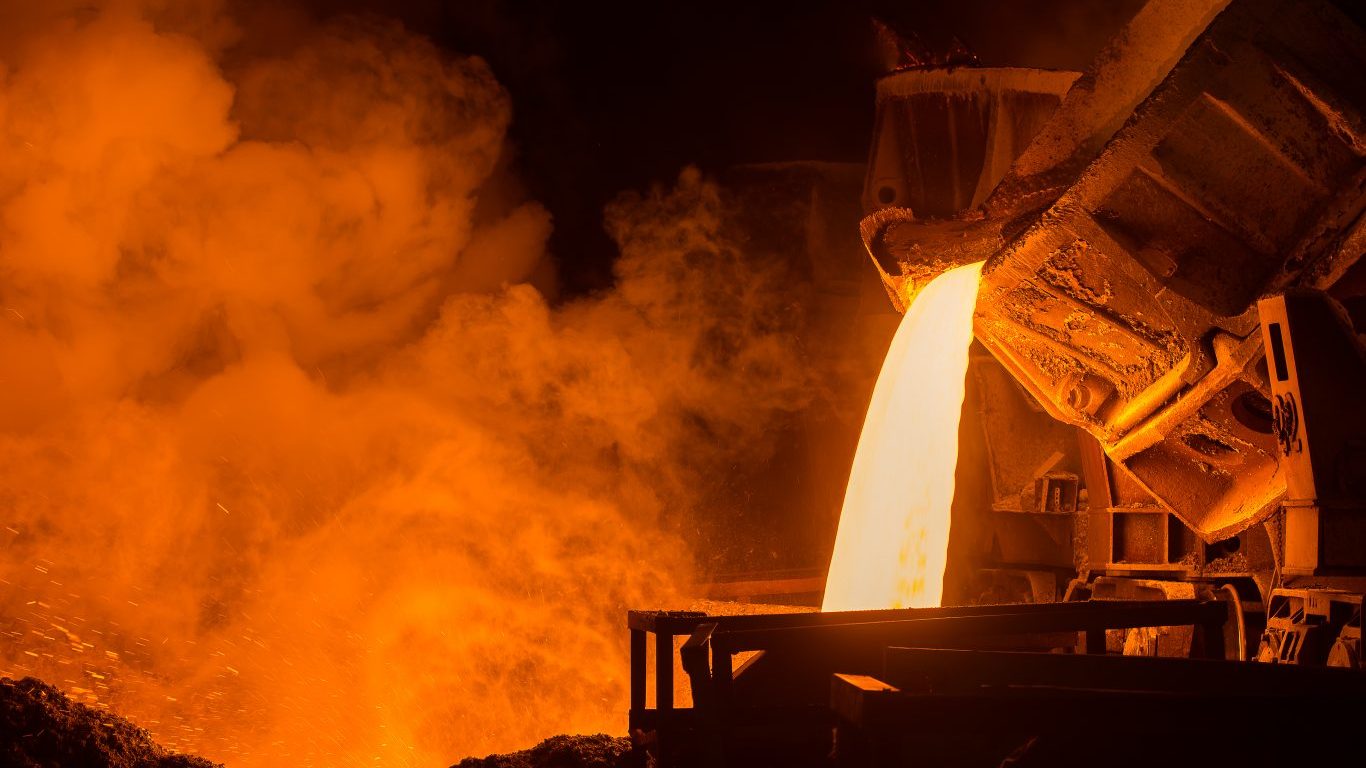

In a bull market stock market, even the current raging bull market, some stocks and some sectors will underperform the market. In a market of stocks, even some of the great companies that date back into the 1800s can see their shares falter. Alcoa Corp. (NYSE: AA) reported dismal earnings for the fourth quarter of 2019. Now that it is no longer a member of the Dow Jones industrial average, many investors no longer even bother looking at the company. The problem with ignoring Alcoa is that it still has better than a $3 billion market capitalization, and the gains and losses it experiences can still bleed over into even the largest of competitors.
24/7 Wall St. routinely looks for issues that bleed into other stocks. With Alcoa being a leader in aluminum, the problem here is that many investors see problems in aluminum also translating into problems for companies involved in steel, copper, titanium and other industrial metals because there is such a high correlation and similar uses in many industries.
As Alcoa shares were down 10.2% at $18.12 late on Thursday, its consensus analyst target price from Refinitiv of $24.05 may seem too good to be true. The low of the day was $18.00, and Alcoa has a 52-week low of $16.46. The stock closed out 2019 at $21.51, and that was down an embarrassing 19% from the end of 2018, compared with nearly a 29% gain in the S&P 500 and better than 22% gain in the Dow. Again, some companies and sectors just do not rise even in strong markets when there are problems.
Value investors can still try to argue that Alcoa is cheap at less than 13 times next year’s previously expected earnings. After another bad earnings report, it’s up to each individual to decide how much they trust those forward valuations now. Many in the metal industries and related industries have pointed out that President Trump’s trade war with China acted as a drag on their businesses. Other companies in those sectors had previously cheered that they would get a fair playing field against China and other nations that dump steel and other metals into the U.S. and other industrial markets. There are other issues to consider as well, from the likes of Boeing’s halt on 737 Max production, the ongoing fears around “peak auto” units sold, less robust oil and gas trends, and even a change in consumer behavior trends compared with prior generations.
One problem for Alcoa and the metals sectors is that the stock market is supposed to discount news for three months, six months and sometimes even 12 months or more. A reality check is that the so-called Efficient Market Theory (or Hypothesis) doesn’t ever seem to work out when it comes to surprises. Otherwise, you would not have gains or losses of 10% or 20% in a single day. Even last June, the trend of downgrading steel stocks and related stocks seemed as though it was endless.
United States Steel Corp. (NYSE: X) announced right before Christmas that it would shut down a “significant portion” of its Great Lakes Works. In an effort to avoid looking like it was giving coal for Christmas to its employees with layoff announcements, the company delivered bad news to investors by slashing its dividend by 80% and also said that it was terminating its share buyback program. Oh, and it lowered guidance as well. U.S. Steel already had been downgraded to Sell at UBS with a low target price of $7 a month ahead of its bad news. Shares of U.S. Steel were last seen down 0.3% at $10.47, with a consensus target price of $9.62 and a 52-week trading range of $9.93 to $24.73.
Iron-ore miner Cleveland-Cliffs Inc. (NYSE: CLF), which announced in late 2019 that it would acquire AK Steel Holding Corp. (NYSE: AKS), was actually bucking the down day with a 0.6% gain to $7.85. Cleveland-Cliffs has a market cap of $2.1 billion, and it has a consensus target price of $8.28 and a 52-week trading range of $6.59 to $12.26. It is valued at 10 times future earnings in a screen, but earnings are in an expected decline, along with revenues.
Nucor Corp. (NYSE: NUE) is one of the most advanced metals players in America, and it was down only 0.1% at $53.35, with a $16 billion market cap. Nucor has a consensus target price of $58.50 and a 52-week trading range of $46.10 to $62.31. It is valued at about 13 times forward earnings, but they are declining along with sales.
Steel Dynamics Inc. (NASDAQ: STLD) still has a positive expectation by analysts, but the 0.6% drop to $32.83 on Thursday was against a 52-week range of $25.03 to $39.35. The consensus target price is $36.17, the market cap is $7 billion, and its valuation is just over 10 times future earnings sales, which are in decline.
Schnitzer Steel Industries Inc. (NASDAQ: SCHN) was down only one cent at $20.78 right before the closing bell. It has a market cap of less than $600 million now, and its consensus target price is $20.50. The 52-week trading range is $18.68 to $27.47. It is now worth just one-third of its value back in 2011. The future valuation is about 13 times next year’s earnings estimates, but it is also expected to have a revenue gain.
Reliance Steel & Aluminum Co. (NYSE: RS) was down 0.7% at $120.48 on Thursday, with an $8 billion market cap after its shares surged higher in 2019. The consensus target price is $119.22, and the 52-week trading range is $75.22 to $122.17.
Century Aluminum Co. (NASDAQ: CENX) traded down by 6.4% at $7.24 on Thursday, without much of a volume spike at all. Century has a market cap of $644 million. It has a consensus target price of $9.67 and a 52-week trading range of $5.02 to $9.98. It was more than a $25 stock as recently as 2014.
Allegheny Technologies Inc. (NYSE: ATI) produces high-performance materials such as titanium and titanium-based alloys, nickel-based alloys, cobalt-based alloys, zirconium and other alloys. The shares were last seen down just 0.4% at $18.81, and its market cap is close to $2.4 billion. The consensus analyst target is $23.78, and the 52-week trading range is $17.03 to $29.50.
Tronox Holdings PLC (NYSE: TROX) is also into titanium ores and other material, and its shares were down 1.5% at $11.81, with a $1.7 billion market cap. Shares are down from a 52-week high of $15.0 and under its consensus analyst target price of $15.22, but they are also way up from a recent low of $6.71. Tronox currently has a 1.6% dividend yield.
Arconic Inc. (NYSE: ARNC), which used to be part of Alcoa before a breakup of the company, ironically was trading up 2.3% at $29.87 late on Thursday. Its 52-week range is $16.12 to $31.99, and its consensus target price is $35.50. Arconic reports earnings at the end of the month and has a market cap of close to $13 billion, now that its shares have nearly doubled from its recent lows.
The good news in metals is that many of these stocks already have been battered over 2019 or in prior years. There are many instances in which the companies are grouped together, rightfully or not, and that seems to happen when there is bad news in particular.
It really does seem unfair to just tie together an entire group of companies when they may have different industry trends. That said, Wall Street tries to identify patterns and place its bets accordingly. The mentality rules that if there is smoke, there must be fire too.
Take This Retirement Quiz To Get Matched With An Advisor Now (Sponsored)
Are you ready for retirement? Planning for retirement can be overwhelming, that’s why it could be a good idea to speak to a fiduciary financial advisor about your goals today.
Start by taking this retirement quiz right here from SmartAsset that will match you with up to 3 financial advisors that serve your area and beyond in 5 minutes. Smart Asset is now matching over 50,000 people a month.
Click here now to get started.
Thank you for reading! Have some feedback for us?
Contact the 24/7 Wall St. editorial team.
 24/7 Wall St.
24/7 Wall St.


